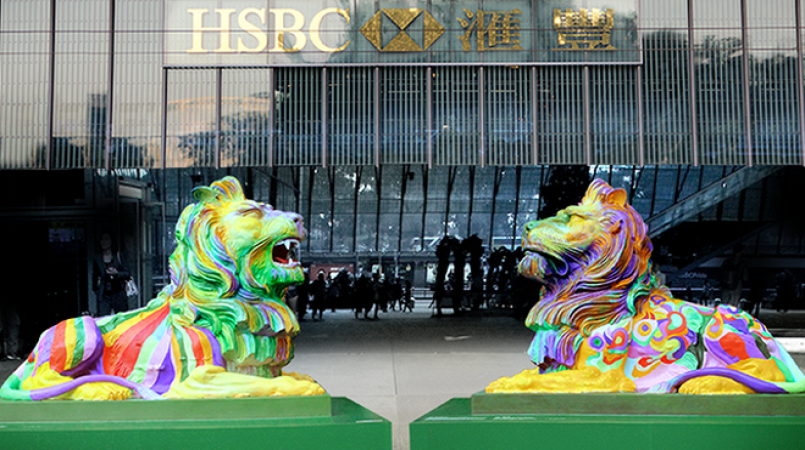
One of Hong Kong's icons - a pair of lions guarding the HSBC building - has been given a rainbow-coloured makeover.
Replicas of the two lions have been painted as part of the bank's "Celebrate Pride, Celebrate Unity" campaign for Lesbian, Gay, Bisexual and Transgender (LGBT) rights.
It's a sight that might not be considered controversial in many cities - but in Hong Kong it has reignited debate about gay rights and whether corporations should get involved.
Many people have expressed support for the campaign - and have been posing for selfies with the lions. But it has also angered several campaign groups, who have started a petition against the lions. Organisers say more than 4,500 people have signed the petition.
Why is there controversy?
Although Hong Kong is an international city, it is divided when it comes to social issues like LGBT rights.
In a 2011 survey, 22% of respondents said they were "not accepting" of lesbian, gay and transgender individuals, and a further 21% said they felt ambivalent or unsure.
A quarter of respondents also felt it was "acceptable" or "sometimes acceptable" to not offer a job to an LGBT individual.
The two HSBC lions are well-known in Hong Kong - and appear on many of the territory's bank notes.
Ahead of the rainbow versions being unveiled, HSBC Group general manager Kevin Martin said: "Understanding and embracing everyone's unique perspectives, beliefs and experiences is core to HSBC's values. This campaign demonstrates our commitment to achieving a truly open and diverse working environment."
But several groups, including the Family Schools Sodo Concern Group, Parents for the Family Association, and Overturning LGBT Agenda, have issued a joint statement, accusing HSBC of "trampling on the existing family values of Hong Kong".
Roger Wong, from the Family Schools Sodo Concern Group, told the BBC: "The lions are an icon of Hong Kong. A lot of Hong Kongers have a certain affection for them - and it's not right that they are projecting meanings on to them, that a lot of people may disagree with.
"The male lions represent the stability and power of the bank. By adding a rainbow on the lions - does that mean they're homosexual? I find that objectionable - and they don't look that aesthetically good either."
The groups say they are also unhappy with other pro-LGBT policies of HSBC - saying the policies are "not fair to the shareholders because it essentially forces every shareholder to endorse the homosexual lifestyle".
Does everyone feel that way?
No. On social media, many people have been vocal about their support for the campaign. On HSBC's Facebook page, one user wrote "support HSBC for their stand for diversity", while another lauded the "beautiful colours and beautiful frame of mind".
And nearly 7,000 people took part in a pride parade last month, marching in support of the LGBT community.
There is also growing support for anti-discrimination laws for LGBT people. In a recent survey, more than half of respondents said they would support such legislation - nearly double the figure from a decade ago.
And young people were especially supportive - with 91% of those aged 18-24 supporting anti-discrimination legislation.
Rights activists have been critical of the fact that Hong Kong has laws prohibiting discrimination on the grounds of gender, disability, race and family status, but not sexual orientation.
They argue that Hong Kong lags behind many Western countries, which have similar attitudes towards LGBT rights but better legal protections.
What is life like for LGBT people in Hong Kong?
Many LGBT people say they experience discrimination - with Hong Kong's first openly gay legislator, Chan Chi-chuen, also being subjected to verbal abuse on public transport.
Wong Ka Ying, a local artist who is a lesbian, says a lot of her LGBT friends have to hide their orientation for fear of losing their jobs.
"I'm really lucky because, as an artist, I don't have peers, colleagues or office politics," she says. "But a lot of my friends in professional industries can't come out."
Without laws against LGBT discrimination, "you don't know where to report it… so you have to hide your sexuality, and not talk about it to protect yourself", she says.
Ms Wong says she was subjected to online attacks after she revealed she was a lesbian on a reality TV show, and argues it is because of a lack of education about LGBT issues.
"In Chinese culture, people tend not to put 'embarrassing' subjects on the table… it's a social norm that keeps discussion of LGBT rights, and same-sex marriage, under the table," she says.
LW, a lawyer who asked not to be identified, says he considered LGBT discrimination to be "pretty serious in Hong Kong".
"Though I think things are changing with the younger generation, discrimination is still quite rampant for the older generation - I am 'out' to my younger colleagues at work but not to my boss."
The Hong Kong government has published anti-LGBT discrimination adverts - but has stopped short of implementing anti-discrimination legislation so far.
Some pro-family or religious groups have argued that an anti-discrimination law could infringe on people's religious freedoms.
